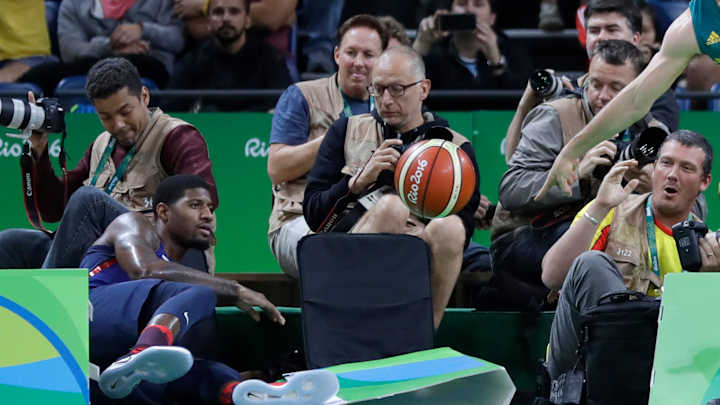Tweet, tweet: US hoop team hearing whistles in Rio Games

RIO DE JANEIRO (AP) When the U.S. Olympic team's charter bus pulled up outside Flamengo Club before practice, police officers closed off the street and one of the motorcycle escorts jumped off his bike and immediately started blowing his whistle.
That's been a familiar noise to the Americans in Rio.
Unbeaten but no longer unchallenged following a very physical, 98-88 win over Australia, the two-time defending gold medalists are still adjusting to FIBA's rules and officials, who call a different game than the one U.S. players have grown accustomed to at home and in the NBA.
''It's weird, actually,'' U.S. forward Kevin Durant said when asked to describe the differences. ''I can't even explain it.''
With 10 first-time Olympians, America's star-studded squad, 3-0 heading into Friday's matchup against Serbia, is learning on the fly what's a foul, what's not, what they can get away with and what they can't.
Right now, starting center Demarcus Cousins doesn't have a clue.
The Sacramento star might as well have bought a ticket and sat in the stands at Carioca Arena 1 for the past two games. Cousins played only eight minutes before fouling out of a 44-point win over Venezuela and he was limited to just 10 minutes against the Aussies after picking up three quick fouls in the first half and No. 4 in the third quarter.
The 6-foot-10 Cousins managed to score 6 points and grabbed eight rebounds during his brief outing against the Aussies, who didn't back down against the world's top-ranked team and may have bent the rules as far as possible with their aggressiveness. Cousins didn't hide his displeasure about a couple calls that went against him, and angrily stormed to the bench where some of his teammates tried to calm him down and encourage him.
It's nothing new to U.S. coach Mike Krzyzewski, who has seen Olympic rookies struggle to adjust to the nuances of international basketball. Every player has to deal with it, but sometimes big men are an easy target.
''First of all, you get frustrated,'' Krzyzewski said. ''You can't get into a rhythm of playing. A couple of the times, they're not fouls. They're just not fouls. But early on in the game, people like to set a tone in how the game is administered. So sometimes, they set it in the post. And so something is called a little bit closer than it would be five minutes later. And I just told him, `You're a human being. You should be frustrated. Let's just move on to the next thing and see if we can handle that going forward, because we need you.'
''In the amount of minutes he's been in there, he's performed very well. We need him to play more.''
The Americans will need him against the Serbs, one of the tournament's most physically imposing teams.
Despite the loss, Australia, which has never won an Olympic medal but has its sights on one in Brazil, showed it might be effective to push the Americans. The U.S. team was slow to push back and didn't seal one of its closest wins in recent Olympics until the fourth quarter, when Carmelo Anthony and Kyrie Irving carried the Americans in the final minutes.
It wasn't as much a wake-up call to the U.S. players as a reminder that everyone in the field is aiming at them.
''It was a good test for us, we definitely needed that,'' Durant said. ''They challenged us. I know we were expected to win the game and expected to be perfect. But every time I have played for Team USA we've had those types of games. We went into overtime in Turkey against Brazil in 2010 and then were tied up with Lithuania with a minute to go in 2012. So you go through those games no matter what. We got the biggest spotlight and the biggest bulls-eye on our back.
''Everybody wants to beat us so there are going to be games like that.''
U.S. forward Paul George said he and his teammates may have gotten a little lax after blowouts over China and Venezuela. As he said after the Australia game, ''It got real.''
''I think the biggest lesson was not being content with where we're at,'' he said. ''We've been so great defensively and put up such huge margins of victory that the second they raised the level we kind of relaxed. We just got to stay consistent throughout the tournament.''
Krzyzewski is teaching his internationally inexperienced team - only Anthony and Durant are returnees from the London team - to watch their behavior when calls aren't going their way. He has implored his players to show restraint so as not to make things worse.
''They're not cheating us is what I tell the guys,'' he said. ''Don't ever get into that. They're not cheating us. We just have to react to it differently. Over 10 years ago, we all were saying, `We're getting cheated.' We've not bought into that for a decade and we're not going to do it now.''
